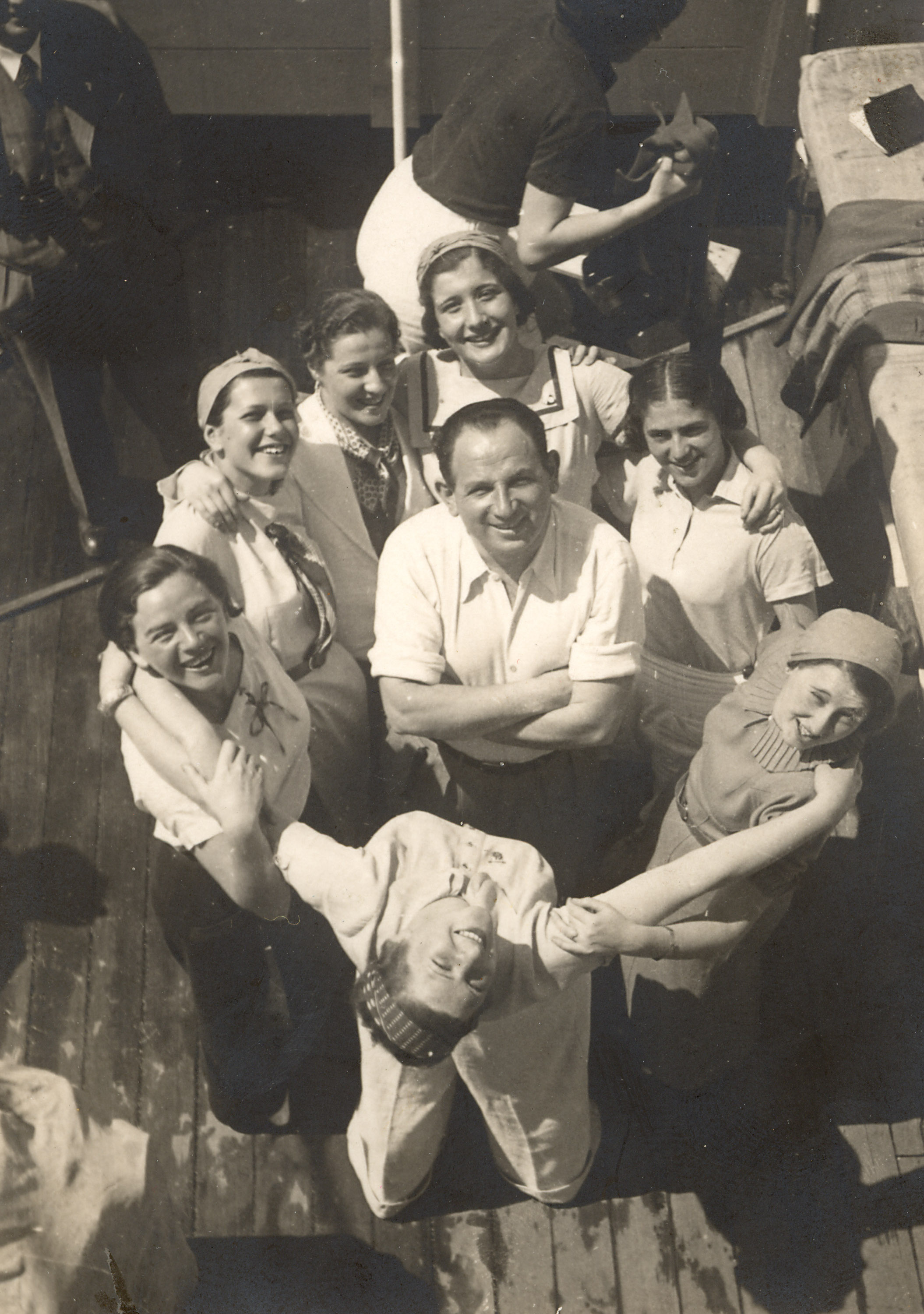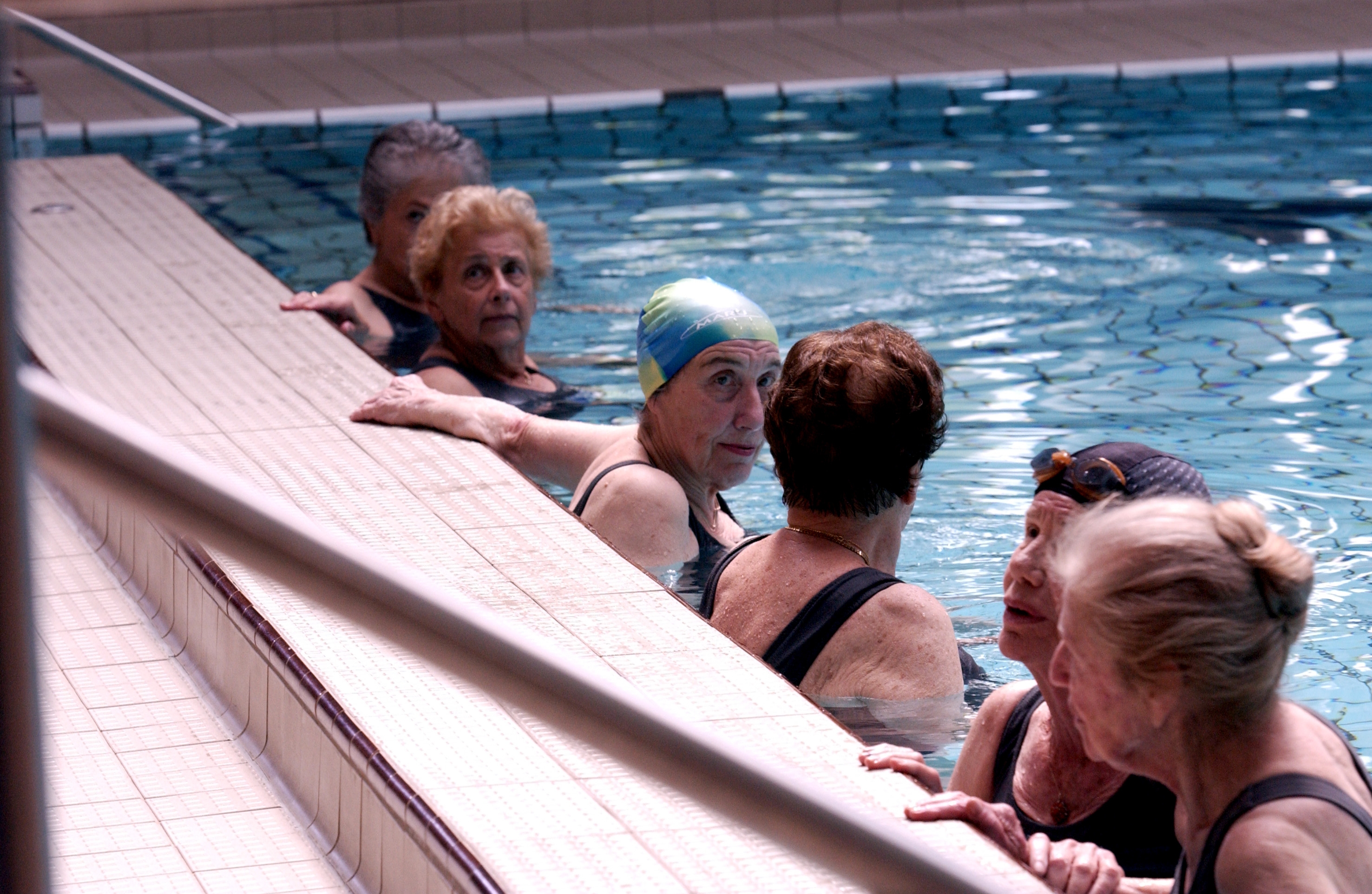|
Watermarks directed by Yaron
Ziberman, Israel, 2004, 77 min., 35mm, color, English/Hebrew/German with
subtitles. San Diego Film Festival: 5 p.m., Tuesday, Feb. 15, AMC
Theatres
Reviewed by Donald
H. Harrison Yaron Ziberman united past and present
by persuading six former swimmers for Ha Koach, the pre-Holocaust Jewish swim
team of Vienna, to travel from their homes in Israel, Great Britain and the
United States to swim once again in the Vienna pool where they had won
national medals and fueled Jewish pride.
 
Then and Now—Ha Koach swim team members crowd around coach
Zsigo Wertheimer,
circa 1935, and return to pool of past glories in 2004 (latter photo by Chris
Van Houts)
In advance of the reunion, Ziberman had each of the octogenarians tell her
story. Anne Marie, before agreeing to participate, insisted that she not be
filmed in a bathing suit outside the water. Perhaps because of some other
unexplained form of modesty, the swimmers' last names were not used in the
documentary.
In the first section of the documentary, we see a cameo interview with Willie
Ehrenreich, then 107, who had helped to found the tennis section of Ha Koach.
Still lucid at his remarkable age, Ehrenreich explained that the sports club had
been founded for Jews in 1909 after they were excluded from Christian clubs in
Austria. Ha Koach—taking its name from the Hebrew word for
"strength"— grew to over 3,000 members and before World War II came
to dominate competitions in various sports, especially swimming.
In telling the stories of how they became involved with Ha Koach, the former
swimmers told of the charismatic swim coach, Zsigo Wertheimer, a tough
taskmaster who did his best to keep the minds of the teenage competitors on
swimming and diving, rather than on boys or other diversions.
Judith was perhaps the best known of the swimmers. In her day, she
dominated competition in the 500-meter and 1,500-meter crawl. Her sister, Hanni,
with whom she reads poetry today in Herzliya, was a promising swimmer, "but
Judith was the champion." Anne Marie, who today lives in the Kew
Gardens section of London, won Vienna's Danube River championship.
"We had to show them that what they could do, we could do better!" she
explained.
In 1935, the women's swim team traveled to Tel Aviv to compete in the second
Maccabiah, a competition in which their team won 18 medals. A swimmer named
Elisheva said the trip changed her life. Instead of the hostility of the
Austrians, she found the warmth of the Jews in the yishuv; instead of the
cold formality in her own family between parent and child, she discovered
families in which parents took a lively interest in what their children
did. She decided to immigrate there—a decision her father greeted with
withering sarcasm.
Yet, after the anschlus of 1938 which united Germany and Austria under
Adolf Hitler's nazi regime, her parents in fact went with her to
Palestine—able to do so, as were the families of all the Ha Koach swimmers,
through the action of the club's president, Valentine Rosenfeld, and friends.
Elisheva, who once studied psychology with Anna Freud, just last year met Erick,
another former Ha Koach athlete, and they are dating. Yes, she assured
Ziberman, there still is physical attraction between people in their 80s.
Prior to the 1936 Berlin
Olympics, the Olympic torch was paraded through Vienna.
In a poignant moment in the film, Hanni related to her Israeli granddaughter how
various sports clubs, including Ewask, one that had adopted the nazi ideology,
marched through Vienna— the cheers from both sides of the parade route
deafening. But when the athletes of Ha Koach marched, the Jewish
athletes could feel the hate coming from both sides of the street. There was
complete silence.
Judith, although a national champion, refused to compete in the nazi
Olympics—a decision that created such anger that the Austrian Sports
Federation deleted all her records from the books. She became a non-person
in Austria—at least until 1995 when the federation apologized and restored the
records of her achievements..
Among the swimmers who participated in the reunion was Anni, 85, a
breaststroker, who today is blind. She has the cover of her backyard
swimming pool in Los Angeles folded back just a portion, in that way
giving her the sensation of a swimming lane. Otherwise, she said, she would be
liable to criss-cross the pool.
We watch as another American, Greta, 83, a former diver, who later would become
a professor at Rutgers University, takes a cab ride through Vienna. The
driver elicits from her that she had left Austria more than 60 years
before. The driver observed that those were hard times—especially for people
like her, "you weren't German, so to speak!" The words visibly
slapped at her, bringing back all those emotions of exclusion and
rejection.
Nanne, 83, once thought that she could move back to Vienna, but returned to the
United States after Kurt Waldheim—who never would own up to his nazi
past—was elected Austria's president.
In a Viennese cabaret, a male singer served up old favorites, including one that
darkened the mood of the reunion. It was a "freedom song" which the
inmates at the Buchenwald concentration camp had sung. "It upsets the
reunion!" Erick complained to Elisheva. "It is enough!"
The group also went to a cemetery, where they placed stones on the grave of Hedy
Wertheimer, wife of their revered coach. When one former swimmer nearly
slipped, she said in a flash of humor, "Careful, I don't want to stay
here—not yet." The final moments of the documentary
brought the swimmers back to their old pool. We see them in their
white bathrobes heading from their dressing rooms to the pool for this
reunion. Their moments back in the water are not to be missed.
|

